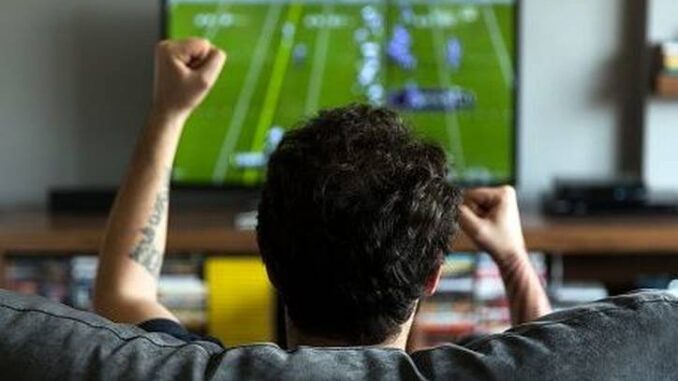
Anything can happen. It’s not over by a long shot. The Season After The Seahawks Won The Super Bowl began with an away game at San Diego on a super-hot Sunday afternoon. Really hot. People were naked in the stands, LEGOLAND melted, the lions at the San Diego Zoo took over the penguin exhibit’s 200,000-gallon pool, complete with lawn chairs and drinks, devouring several of the unfortunate, tuxedoed creatures in the process, more out of habit than hunger given it was too hot to eat. It was crazy.
Oh, the game! It was an even match like most early-season games as the players hadn’t been concussed or had legs torn off yet. We despairingly watched Antonio Gates make a game-sealing, diving touchdown catch to officially hand the reigning Super Bowl champions a big fat 0-1 record.
Of course, despite this setback, that season generated a second, albeit nightmarish, Super Bowl appearance, the outcome of which forced a six-month-long, self-imposed media blackout so we could actually function at work. Then the years flew by, with several up-and-down seasons, most of which resulted in playoff appearances and several IRS audits based on our questionable accounting practices, neither of which amounted to much. And here we are, today, traumatized Seahawks fans.
Watching Sunday’s game against the Titans likely felt the same for every fan regardless of how drunk they were. Optimism and confidence prevailed in the first half, followed by an “Oh, this again,” deflating second half. We all wondered the same thing. Why is the new offense giving up three-and-outs that span 24 seconds? Is the Titan defense that good and simply made the right adjustments? Is that female ref cute? Wait, shouldn’t we anticipate their adjustments? Why does DJ Metcalf keep getting penalties? Why does the entire team, including the waterboys, generate penalties? Where’s our car? Why is this so nerve-wracking? Did Tampa Bay really just score 48 points? Why can’t we just thump somebody and thus not suffer anxiety attacks? Do people think the male refs are cute too?
Fandom is stressful, with Seahawks fandom being the most stressful in the league, which may explain why Seahawks fans are some of the most notoriously awful fans NFL-wide, at least on an obnoxious scale. Which is better than a felony assault scale, although we all know undercover SPD officers prowl about Lumen field dressed in visiting team gear to basically entrap the lunatics who are six bloody mary’s, eight beers, and one flask of Jack Daniel’s in. Which, frankly, they should. Entrap that is—the cops. Nobody should have 20 drinks at a football game.
Yet, some people we want to emulate seemingly react to stressful situations with a calm nonchalance. There are two reasons why. The first involves an incredible capacity to handle physical and mental strain ala the NAVY Seals or other Special Forces Communities, whose secret maxim works like this:
“Always look cool.”
“Always know where you are and what you are doing.”
“Even if you don’t know where you are or what you are doing, always look cool.”
This capacity is a genetic or other-worldly gift (we don’t find out until we die). In the case of Special Forces folks or professional athletes, it’s perfected through vomit-inducing training, coupled with sharp honing, until it becomes not second- but first-nature.
The other reason involves being so dense and unthoughtful that the realization of risk, uncertainty, and import is never actualized in the synapse, which is also either a genetic or other-worldly gift, the origins of which are revealed upon death. The dolt’s maxim best represents it:
“Just don’t care.”
This is great advice if you don’t actually care, but terrible advice if you’re a kicker on the 34-yard line with two seconds left down by two. Or if you’re a slightly overweight, Cheeto-munching, pilsner-swilling, middle-aged fan watching that kicker.
Enter Seahawks fandom. Surely many teams in the NFL suffer from tight-game stress season after season, and we don’t realize this because we absolutely don’t care about them. But somehow, it’s different in Seattle, given that even great seasons feature frequent come-from-behind wins, or at a minimum, a point differential of seven or less with the opposing team driving downfield in the waning seconds of the fourth quarter. Or, to re-emphasize the obvious, looking at the team and thinking, “Just possess the ball for like 3 minutes, that’s it, just a few possessions oh please.” Made worse by enviously, desperately, and longingly watching the ticker of updated scores across the league, some with three to five touchdown margins and three minutes remaining.
Sure, the NFC West is insanely tough, and we as individuals have no credibility, given we can barely throw a football ten yards with the wind at our back in an empty park on a sunny day. The bottom line is, as confusing at is it to watch history repeat itself, and how great it is that Seattle offers unbelievably entertaining games on any prime-time slot (Thursday, Sunday, or Monday night football) – entrancing the fans as well as the networks since networks love the ad revenue secondary to excellent ratings from these close games as well as the subsequent opportunities to buy more gold-plated Gulfstream G650s – it’s damaging our mental health.
But why is this so? Unless one is subject to gambling addiction and associated threats of physical violence from organized crime-affiliated bookmakers, the outcome of a football game is inconsequential. So why do we sweat, shake, pace, fist-shake, feel sick, and ultimately care?
It turns out our messed-up brains are partially messed up by our ability to empathize. Mirror neurons allow us to understand points of view outside our own, the exception being politics, where regardless of the topic or issue, the brain goes completely blank. We go blind and are literally unable to even remotely want to try to understand each other’s point of view, especially if meeting in the middle is required for progress, the benefit of society, or even our own prosperity. But for football, mirror neurons kick in like crazy, as evidenced by the use of the first person plural pronoun “we,” as in, “All we have to do is not go three and out in 22 seconds and…ah crap!”
These empathetic feelings are intensified while watching football because when we watch our team on the field, we are, literally quite naturally, experiencing a portion of the feelings the players have because our mirror neurons are at work. The same goes for the cheerleaders; when we concentrate on them, we feel lithe, happy, and endlessly encouraging and optimistic about our chances to get a part in a feature film or at least a modeling contract.
What a disaster, and it gets worse. When the Seahawks win or play well, our noggins release the neurotransmitter dopamine, which regulates our pleasure centers as if we’ve stumbled upon a cache of excellent drugs, not that we’ve done that. Conversely, when the Seahawks commit 972 penalties, not thanks to a defense that’s so powerful, aggressive, and hungry that it doesn’t matter or at least is just the price for being so predator-like, the brain releases cortisol or the stress hormone. And thus comes the pacing and other compensatory measures like making then gorging upon chili-cheese nachos with pulled pork on top. Yum. But the stress is still there despite this slovenly behavior, in turn lowering our favorite neuro transmitting mood stabilizer serotonin, which can lead to anger and depression, the latter of which is associated with ecstasy hangovers, so we hear.
No wonder we’re exhausted after yet another down-to-the-wire, half-a-score margin Seahawks game, regardless of the outcome. But there’s more – we reflect the anxiety the players themselves experience. This includes cognitive and somatic anxiety, or in ordinary words, racing thoughts in the brain in the face of uncertainty leading to fun things like profuse sweating and feeling like we might barf all over the place. Which would be bad given the chili-cheese, pulled pork-slathered nachos we just housed down.
And victory is no cure. Another thing that can happen when our team wins or when we find out this Friday night our spouse is going out with their friends and our kid is going to a sleepover is our brains are thrown into an excitatory state thanks to the activation of the hormone adrenaline, which increases heart rates, blood pressures and desires to watch action movies and drink beer because we have the house to ourselves. Of course, this also happens during the stress and nervousness of a close game, during which the body diverts blood flow to essential organs like the brain and heart, but not so much to our stomachs, thus the tummy “butterfly” effect.
If we’re worried about our health or simply don’t like the way we feel during a game, doctors recommend taking fandom into perspective and, like many of the things we worry about, focus on how in the greater scheme of our lives, the outcome is not that big of a deal. After all (these quacks who probably smoke Marlboros and have questionable medical credentialing claims), NFL football is meant for entertainment purposes and takes our minds off the stressors and struggles we have in the real world.
Right. Tell that to our bookie. Victory is everything. Here’s to the emotional rollercoaster that is Seahawks fandom. We’re already prepping nacho toppings for this Sunday’s game. We suggest watching a comedy immediately afterward, maybe revisit Old School, The Hangover, 40-Year-Old Virgin, or some such quality film we wish we’d written. Just to take the mind off everything and hopefully, get a good night’s sleep despite the excitement.




